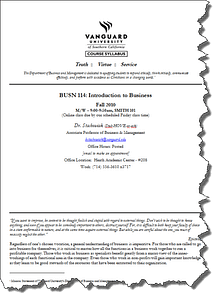- Begin with the end in mind. Stephen Covey reminds us that it is crucial in setting out to do anything to “begin with the end in mind.” As you develop or revise your syllabus, think about the three most important things the students should walk away with after investing months in your course. Consider not just the factual information they will absorb, but the skills they will gain as well.
- Don't start over unless you must. All accredited universities are bound to have done some work defining their learning objectives to their governing body. While professors who live up to the stereotypes have their strengths, working in a collaborative fashion is not typically one of them. Often times, they'll forget to give you what has already been developed to help you steer the direction of your course. If you haven't already been provided this information, ask the chair or dean what documentation is available that was used to evaluate your program for your accrediting body, so that you can align your course objectives with the broader goals.
- Get samples and then make the course your own. Universities can be divided into two broad categories, when it comes to syllabi: those who have pre-prescribed syllabi for the majority of their classes with little room for the instructor to customize the document and those who stress the importance of what each professor brings to a course. If you're teaching from a standard syllabus, get as much of a sense as you can of how they arrived at their conclusions of what the learning objectives should be and focus your attention on facilitating that learning. Those who are expected to develop your own syllabus should note that most academics consider their syllabi to be like
 a journal article they spent years researching and crafting. You can use them as samples to then build your own, but even a recommended reading list can be considered proprietary by a faculty member, so tread cautiously and ask before using someone else's work.
a journal article they spent years researching and crafting. You can use them as samples to then build your own, but even a recommended reading list can be considered proprietary by a faculty member, so tread cautiously and ask before using someone else's work. - Set expectations in advance by using rubrics. Probably my greatest discovery as a new professor was a short book called Introduction to Rubrics. I'll spend more time on rubrics in a future post, but suffice to say that they make your ability to facilitate learning far greater, your grading more fair, and help students know where they need to be to meet the expectations. I no longer assign anything in a course without having a rubric that shows in advance how the students will be graded.
- Leverage technology. Many professors no longer distribute their syllabi in a hard copy format, but instead post it on the university's course management system or their personal website. This not only saves trees, but allows you to take full advantage of the ability to use links both within a Word document (from one section to an appendix, for example), but also to link outside the document (such as to a collection of links for your class posted to a bookmark sharing tool, such as www.delicious.com). I also use an auto-created table of contents, so the learner can easily navigate to various sections of the syllabus as needed. Consider only distributing your syllabus in PDF format, so it is most likely to remain in its original format and be most widely read by different computers/systems.
Wishing you a successful start to your teaching year,



Hi,
I was reading this https://teachinginhighered.com/teaching/five-keys-to-an-effective-syllabus/ and found a broken link referring http://honolulu.hawaii.edu/intranet/committees/FacDevCom/guidebk/teachtip/teachtip.htm (under #1, develop or revise your syllabus section).
It looks like original content was removed from the website, but article is still available via this URL http://icebreakerideas.com/teaching-tips/
Might want to fix it to help other readers.
Have a great day,
Kelly
Thank you for alerting me to that broken link, Kelly. I’ve fixed it in the post and appreciate the nudge and the updated link.